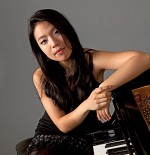Title
Joyce Yang’s career hasn’t exactly gotten off to a rocky start. With a medal from the Cliburn Competition, a coveted Avery Fisher Career Grant, and a list of orchestra appearances eminent enough to make Herbert von Karajan blush, the pianist has accomplished at age 25 what would take most pianists several lifetimes.
Body
Wherefore, then, did she enter the William Petschek Piano Recital Award competition?
“I felt like the New York stage pushes me hard, and I haven’t really done a New York date in a while,” Yang (Pre-College ’04; B.M. ’10) said in a recent Skype interview with The Journal. “I simply looked at it as an Alice Tully recital.”
After the death of William Petschek in 1980, an annual piano recital was established in his name to provide debut opportunities to the cream of Juilliard’s crop. Though it was described as a “coming-out concert” by Charles Petschek, William’s nephew, in a 1998 New York Times interview, Yang sees her first-ever solo appearance in Alice Tully Hall as neither a debutante ball, nor even a wedding ceremony. Rather, for this seasoned veteran of the international concert stage, it marks a renewal of vows with the city that catapulted her to fame.
Indeed, it was six years ago this May when Yang burst on to the international scene, having just completed her first year as an undergraduate at Juilliard. While most other 19-year-old undergrads were lugging the dust-ridden contents of their dorm rooms down the freight elevator of the Meredith Willson Residence Hall, freshly shell-shocked from their first nine-month tour of duty at 60 Lincoln Center Plaza, Joyce Yang was on a plane for hot and sunny Fort Worth, Tex., home of the Super Bowl of international piano competitions: the Van Cliburn. Two weeks later, she walked away as the all-around winner, pocketing the silver medal as well as two additional awards for best-performance of a new work and best performance of chamber music.
“I had really no idea I was going to advance. It was a real shock for me to walk away with the silver,” said Yang, whose experience at the Van Cliburn was so overwhelming she lost 15 pounds over the course of the competition—hardly a desirable condition for a final-round performance of Prokofiev’s herculean Second Concerto. “I was physically weak but the head kept going,” she said. “It became at that point a stamina test rather than artistry.”
A native of Seoul, Yang displayed an early precocity that was difficult to account for. She did not come from a musical family, and if it hadn’t for the piano lessons she began taking with her aunt at age 4, she might never have realized her musical potential. Much of her artistic spark, as it turns out, seems to have been intrinsic. As a 9-year-old sitting in a practice room learning Beethoven’s Second Piano Concerto, Yang experienced a pivotal moment in her musical awakening. “I remember being so ecstatic for 15 minutes,” she said. “That’s the first time I felt like I wasn’t just pressing the keys, and really heard something.”
A year later, Yang was paying a visit to New York City to play for world-renowned pedagogue Yoheved (Veda) Kaplinsky, who was impressed enough to offer her a place in her Pre-College studio at Juilliard. Since then, Kaplinsky has been a kind of second mother to Yang—nurturing her talent, providing emotional support, and ultimately paving the way for her career.
Today, as Yang tours the world from Salt Lake City to Sydney, Kaplinsky remains a strong spiritual presence. “Sometimes when I practice I can hear Veda in the back of my head. I can actually hear what she would say to me,” said Yang.
Though her formative influences will surely come through on the stage of Tully, it is the irreducible qualities belonging solely to Yang that will speak most clearly to the audience. A synesthete herself, Yang will literally be weaving colors and shapes in her interpretations of Scarlatti, Currier, Debussy, Liebermann, Chopin-Liszt, and Schumann.
“Putting these pieces together—pieces that are reminiscent of each other—allows us to listen in a new way and from different angles,” Yang’s program notes state, revealing a character trait that is perhaps crucial to understanding her success. This pursuit of new and different experiences, whether in music or in life itself, may very well secure Yang’s place on the international scene for decades to come.





